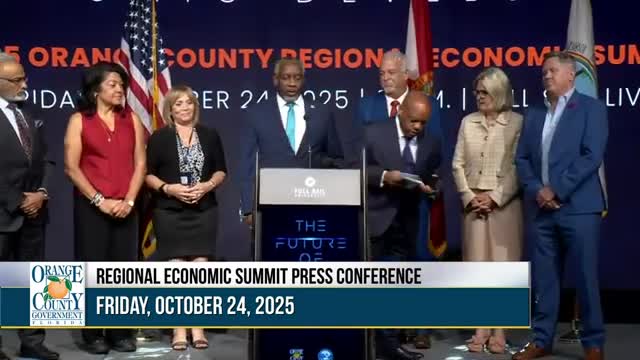Regional leaders press for dedicated transit funding, new film incentives and workforce supports
Get AI-powered insights, summaries, and transcripts
Subscribe
Summary
Mayors and county chairmen at the 2025 Orange County Regional Economic Summit urged a regional approach to mass transit funding, announced local plans for new film incentives in Orange County, and described workforce and equity programs including Osceola County’s free-college initiative for high school graduates.
Mayor Demings and fellow regional leaders used the 2025 Orange County Regional Economic Summit to press for a dedicated, regional funding source for mass transit, announce local steps to revive film incentives in Orange County and describe workforce and equity efforts aimed at keeping talent in the region.
“Our goal today was really to have a regional conversation … to diversify our economy and to strengthen our region,” Mayor Demings said, opening the discussion on transportation, economic diversification and collaboration across counties.
Why it matters: Officials said tourism and other job centers concentrated along the International Drive corridor make improved transit a regional priority; they warned that delaying a dedicated funding source will make future projects harder and more expensive. County leaders also said Orange County will move forward with a local film-incentive program in the current fiscal year as part of broader efforts to retain talent produced by local universities and training programs.
Transportation and funding
Mayor Demings said the region needs “a mass transit system, a multimodal system” and estimated the full buildout would cost “in excess of, 20, probably 25 plus billion dollars.” He pointed to projects already discussed publicly — including SunRail extensions and Brightline connections — and said those projects will require public–private partnerships and “significant dollars to make that happen.”
Seminole County Chairman Jay Zimbower echoed the need for a dedicated funding stream. “A dedicated funding source, I ultimately believe, is where the vehicle lies to get this done,” Zimbower said, adding that his county will “do our portion and collaborate with our sister counties.” Zimbower also said his board has supplied requested materials to the state CFO and that officials are awaiting the CFO’s communications.
Private-sector participation and tourism tax
Demings said private actors have signaled interest in partnering on rail expansions. He cited Universal Orlando Resort as an example of the corporate community offering partnership if passenger rail expanded from the airport westward. The mayor and other officials said any large rail expansion will require public-private dollars and regional cooperation.
Officials discussed the tourist development tax (TDT) as a potential source for some local funding, but cautioned that any change would depend on the Florida Legislature. “There may be an opportunity … to expand the eligible uses of tourist development tax receipts,” Demings said, and added that local leaders will advocate at the state level to preserve local decision-making authority.
Film incentives and workforce development
Demings said Orange County’s new fiscal year — which began Oct. 1 — includes plans to reintroduce film incentives at the county level. “Very soon, you will hear some announcements,” he said, and named Roseanne Harrington, his chief of staff, as leading county efforts to implement the program.
Brandon Arrington, Osceola County vice chairman, described Osceola Prosper, a local program that provides free college for that county’s high school graduates. “We Osceola County, this is the fourth year in a row where we’re giving a free college education to every one of our high school graduates,” Arrington said, framing the initiative as a long-term workforce-development strategy to prevent “brain drain” and create career pathways rather than temporary jobs.
Equity and metrics
A reporter asked how local governments would ensure growth benefits historically underserved communities and what metrics would be tracked. Demings said counties are shifting away from older MWBE program structures in response to recent federal executive orders and are instead emphasizing small-business capacity-building, community engagement and partnerships with organizations such as the Edith Bush Institute and CareerSource of Central Florida to prepare local talent.
Local governance and elections
Demings noted that Orange County’s board of county commissioners will expand from seven to nine members in 2026 and urged voters to pay attention to the upcoming elections because the new board makeup will affect policy for years. When a questioner suggested he might run for governor, Demings said only that he was “very interested in it” and that he would discuss it further in the near future.
What was not decided
The summit produced no votes or formal county actions recorded during the session. Officials described planned programs (film incentives, capacity-building for small businesses) and said staff will continue implementation work; they also said they are awaiting additional information from state-level offices on matters under review. Several speakers emphasized that legislative changes at the state level could affect local options.
Ending
Regional leaders closed the session by stressing continued collaboration across Orange, Osceola and Seminole counties on transportation, workforce and economic development. “We have to put our heads together collectively,” Demings said, describing the region’s approach as a bipartisan, multi-jurisdictional effort to sustain growth and opportunity.
